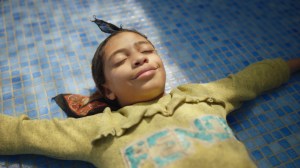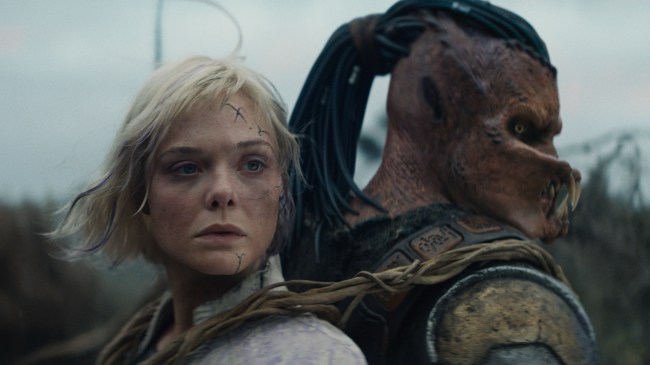


Dan Trachtenberg loves the Predator more than most people love their own children, but that doesn’t quite explain why his “Predator” movies — of which there are suddenly now three — continue to be so much better than all of the series’ previous sequels, spinoffs, and reboots (let alone most of the IP-driven garbage that Hollywood churns out on the regular). No, Trachtenberg’s “Predator” movies are so uncommonly satisfying because his love for the franchise’s extraterrestrial trophy hunters allows him to celebrate how dumb they are.
No disrespect to the many different warrior tribes who may have inspired the Yautja, but there’s something fundamentally backwards about a hyper-advanced alien species that — despite having solved intergalactic travel — still only knows how to measure its own worth in murder and masculine aggression. ‘Twas ever thus, on Earth as it is in the heavens, but Trachtenberg recognizes that the Predators are always just a bit more embarrassing than they are badass.
The genius of the franchise-reviving “Prey” and last summer’s utterly awesome “Killer of Killers” is that they both cast the Yautja as a foil first and an antagonist second. Now, the super fun and fantastically spirited “Predator: Badlands” takes that approach to its logical conclusion by making one of these creatures the hero of a story in which he gets deprogrammed of his culture’s “The Most Dangerous Game”-inspired approach to other species.
Yes, “Alien vs. Predator” struck a short-lived Yautja-human alliance out of situational necessity, but Trachtenberg’s latest hunt takes direct aim at the evolutionary uselessness of being the universe’s biggest assholes. The Xenomorphs aren’t smart enough to know any better, but these “ugly motherfuckers” have invisibility cloaks and triangulated laser sights! They’ve been around long enough to have T. rex skulls on their mantelpieces! They are — collectively — now the only performers in movie history who’ve ever shared the screen with Arnold Schwarzenegger and Elle Fanning, and they’ve held their own against them both!
And yet, for all of those accomplishments, the Yautja’s religious credo has never evolved beyond “Prey to none, friend to none, predator to all.” Congratulations for surviving more than 65 million years on the Greek “Star Wars” concept art of a planet you idiots call home, but as someone asks at a crucial moment during the middle of “Badlands,” “Who would want to survive on their own?”
True to “Predator” style, that’s a question Patrick Aison and Brian Duffield’s script answers less with gooey sentiment than with ruthless practicality: It’s a lot easier to survive with some help. In theory, that should appeal to a member of the Yautja clan, or — as the case may be — a runty youngling determined to prove his worth and be accepted into his father’s clan. His name is Dek, he’s played with terrific expressiveness by Dimitrius Schuster-Koloamatangi (the movie is only a few minutes old before he offers us a heartrending portrait of what fear looks like on a Predator’s toothy face), and if the ultra-Darwinian wildlife on his birth planet doesn’t kill him, then his dad will be all too happy to finish the job.
Also played by Schuster-Koloamatangi, Njohrr likes to think of himself as the king shit apex Yautja, and he’s so disgusted by the scrawniness of his youngest son that he instructs the elder Kwei (Mike Homik) to kill Dek in his sleep. But Kwei, in the first display of mercy or kindness that Dek has ever seen, refuses to kill his own brother. Instead, he sends Dek to the “death planet” Genna, where the undersized youngling will have a chance to prove his worth by slaying a creature that no member of his species has ever been able to kill: the fearsome Kalisk.
So begins the first “Predator” film in which the eponymous hunter is far and away the most vulnerable character, a novelty that “Badlands” stresses by dropping Dek into the middle of a live-action “Scavengers Reign.” Genna — pronounced with a hard “G” and not like George W. Bush’s daughter — more than lives up to its reputation, in that absolutely everything on the planet has evolved to kill anyone unlucky enough to crash-land there. The grass is made out of razors, the trees have “Deep Rising”-style tentacles for branches, and even the cute-named Luna Bugs are eldritch horrors waiting to bring death from above. Genna’s bland gray landscapes may fall well short of Pandoran wonder (though random sky lava makes up for any manner of sins), but its flora and fauna are a constant delight, and there isn’t a doubt in our minds that even a trained survivalist like Dek would die in about 10 minutes flat without some of the help he’s been conditioned to see as a weakness.
Enter: Thia, a Weyland-Yutani synthetic who’s been ripped in half by the very beast that Dek has come to kill. Despite being separated from her legs and stranded on a perch where she’s had nothing to do but study the planet’s indigenous life, the chipper and childlike artificial humanoid immediately becomes the happiest character this franchise has ever seen, and Elle Fanning’s extremely winning performance — an awards-worthy marvel of ingenuity, guiltlessness, and troubled empathy — makes her the most interesting character this franchise has ever seen almost just as fast. She promises to help guide Dek to the Kalisk’s den if he agrees to help reunite her with her lower half (an offer that Dek can only bring himself to accept by thinking of Thia as “a tool”), and so the two begin their journey across the wilds of Genna, the synth strapped to the Predator’s back.

It’s all very Luke and Yoda, but if Luke were a curmudgeonly hunter whose species had evolved in a way that made it impossible for them to smile, and if Yoda were a button-nosed chatterbox whose ancient wisdom belied the naiveté of a teenage girl on the brink of her first heartbreak (it’s no spoiler to say that Thia’s much-discussed “sister” Tessa, also played by Fanning, doesn’t share our new favorite synth’s capacity to care about other creatures). Confronting the po-faced seriousness of the “Predator” franchise with the same insolence that’s required of Dek to stand up to his dad, “Badlands” exalts in the endearing dynamic that forms between these two characters, and it refuses to flinch away from that charm even when the movie threatens to steer closer to sweeter, more streaming-friendly territory than diehard “Predator” fans might have liked.
Crucially, however, Trachtenberg and his screenwriters find ways to be cute without pandering, just as they find ways to be absolutely brutal without shedding human blood — a workaround that allows them to honor the franchise’s brutality under the auspices of a PG-13 rating. I got more than a little nervous when the heroes team up with an adorable CGI creature who Thia names “Bud” (imagine an adorably huge-eyed green monkey with iron skin), but “Badlands” deploys the little guy to perfection, cleverly positioning Bud as a reminder of Genna’s “kill or be killed” savagery rather than as a simple concession to post-Grogu economics.
Unlike Thia, who has the benefit of a universal translator, kindness — or at least a begrudgingly mutual concern — is the closest thing that Dek and Bud have to a shared language, and it’s consistently rewarding to watch both of these characters learn to speak it on their own terms. Dek has been taught that “to forgive weakness is to show weakness,” and yet “weaknesses” like grief, longing, and sensitivity all become essential tools in his quest to kill the Kalisk and escape from Genna in one piece. In fact, those tools prove even Moree essential to this story than familiar Yautja weaponry, which Trachtenberg nevertheless finds a number of novel and exciting ways to mix into the combat; the “awesomeness” factor here is never cranked quite as high as it was in “Killer of Killers,” but the action is so full of fist-pumping moments that I almost didn’t care that the climax is staged in the most generic location imaginable, or that it threatens to devolve into a better-staged version of the pixel-vs.-pixel kaiju fights that have made the recent “Kong” movies feel all but weightless.
Such audience-friendly pivots away from the franchise’s core principles might have been disastrous in a lesser version of this film, but even — or especially — the least “Predator”-like moments in this standalone sequel are rooted in Trachtenberg’s love for the property, and all help “Badlands” to make a uniquely compelling argument that “Predator” deserves to be higher on the Hollywood food chain than anyone thought to place it over the last 40 years. By reckoning with the series’ fundamental weakness rather than continuing to pretend that it’s the series’ greatest strength, Trachtenberg has made the brand richer than ever before. No, this isn’t your daddy’s “Predator,” and it definitely isn’t Dec’s daddy’s “Predator,” but as a wise synthetic once said, “We can be more than what they ask of us.” How rare — and extremely refreshing — to see a big studio movie recognize that the same can be true of itself.
Grade: B+
20th Century Studios will release “Predator: Badlands” in theaters on Friday, November 7.
Want to stay up to date on IndieWire’s film reviews and critical thoughts? Subscribe now to our newly launched newsletter, In Review by David Ehrlich, in which our Chief Film Critic and Head Reviews Editor rounds up the best new reviews and streaming picks along with some exclusive musings — all only available to subscribers.
Source link

اترك تعليقاً